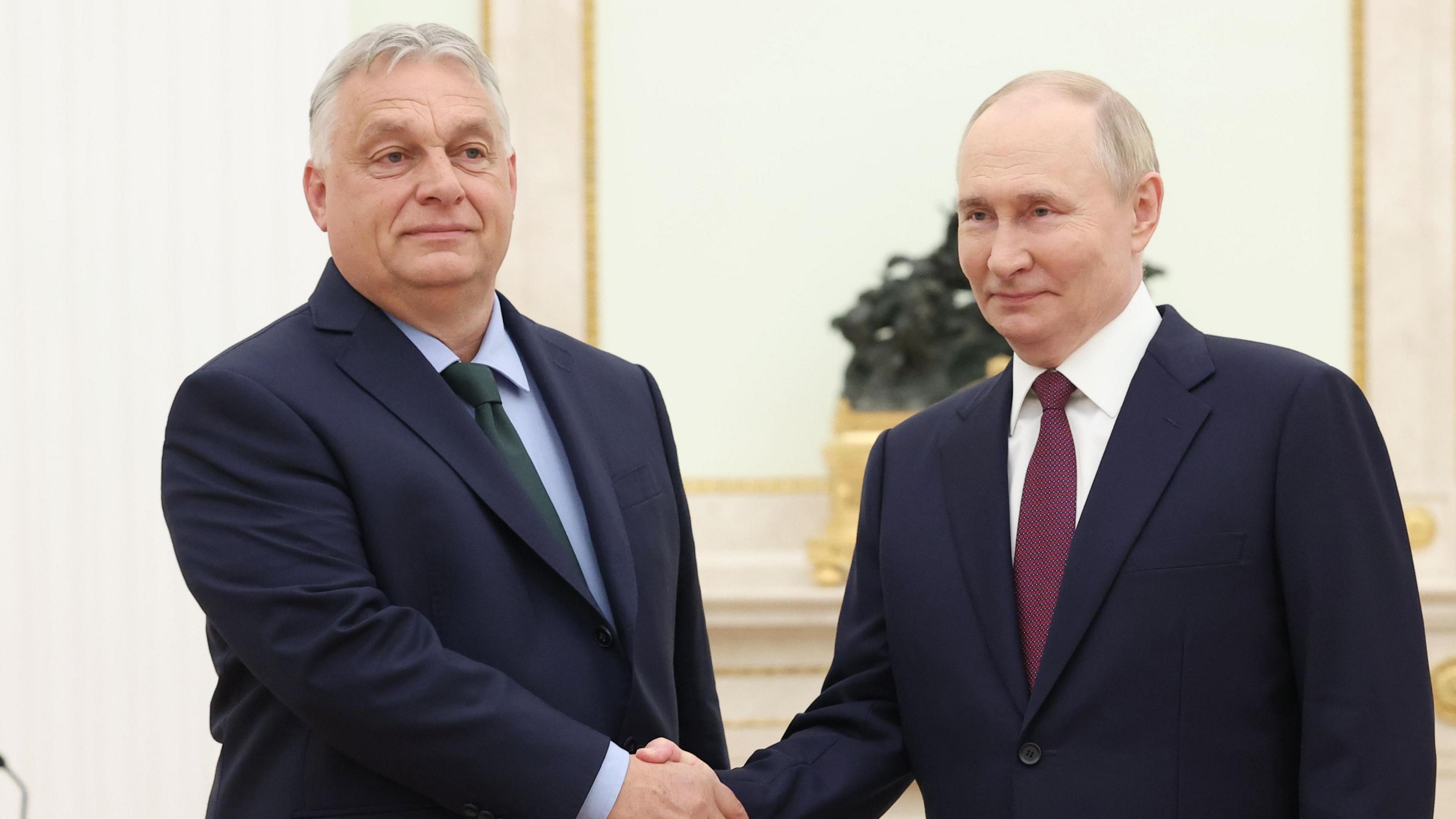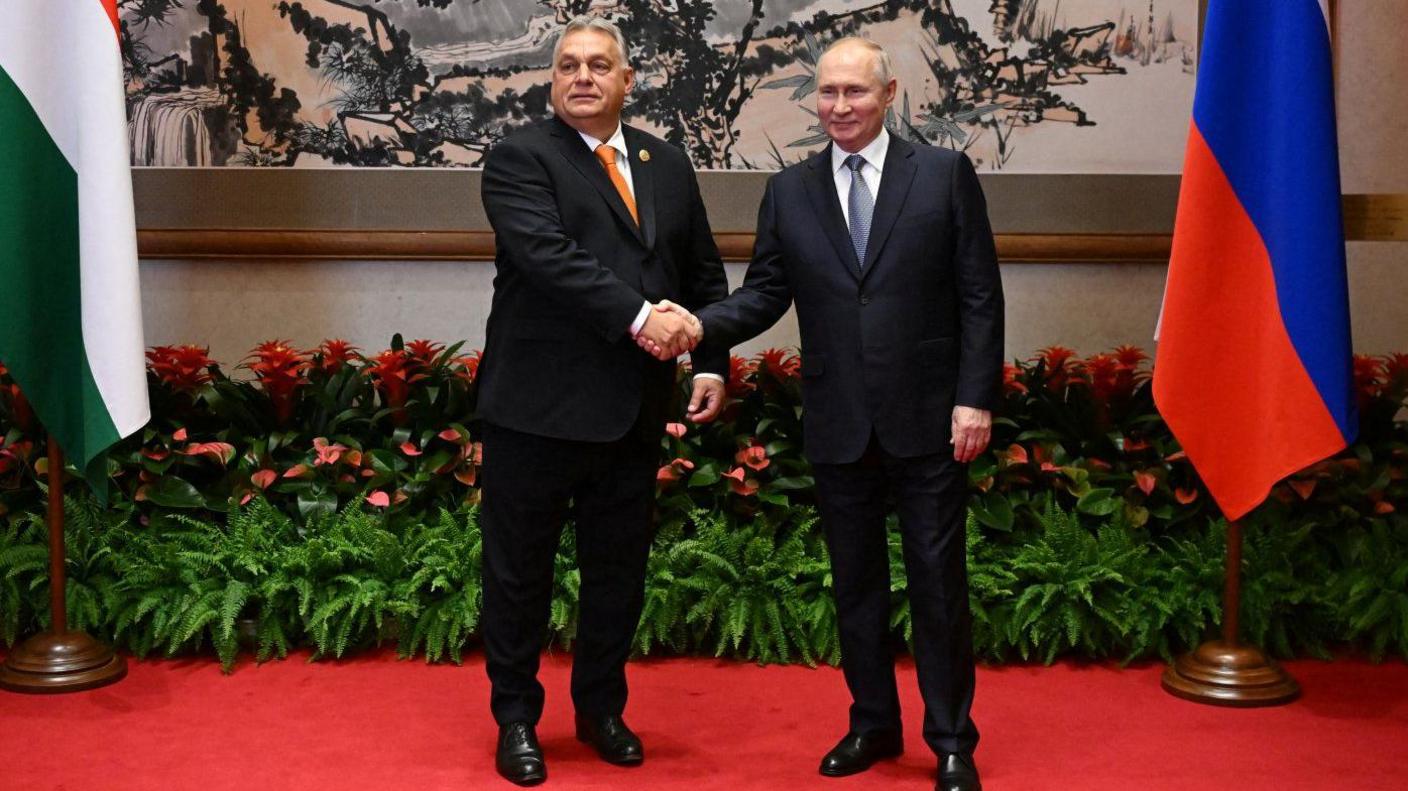Hungary's Russia-friendly PM meets Putin in Moscow

- Published
Hungary's Prime Minister Viktor Orban has met Russian President Vladimir Putin in Moscow, in a visit that has been heavily criticised by EU leaders and Ukraine's government.
Friday's meeting was part of what Mr Orban called a "peace mission", coming three days after a visit to Kyiv where he met Ukraine's President Volodymyr Zelensky.
Hungary has just taken over the presidency of the Council of the European Union, but EU leaders have stressed that Mr Orban is not acting on behalf of the bloc.
Mr Orban is the EU's only head of government to have kept close ties to the Kremlin following its full-scale invasion of Ukraine in 2022.
After the meeting, which lasted several hours, Hungary's PM said Russia and Ukraine were still "far apart" in their views on achieving peace.
"Many steps are needed to end the war, but we took the first step to restore dialogue," he said.
The Russian leader called it a "frank and useful" conversation. He also repeated a previously rejected proposal for Ukraine to withdraw from regions in the south and east of the country which Russia claims to have annexed - an area that includes territory Russia does not currently occupy.
Volodymyr Zelensky has long said Ukraine will not negotiate with Moscow until Russian forces leave all Ukrainian territory, including Crimea.
Earlier, Mr Putin said Mr Orban was visiting "not just as a long-time partner" but as a European Union representative.
However, European leaders openly condemned the Moscow trip and emphasised he was not representing the EU.
"The EU rotating presidency has no mandate to engage with Russia on behalf of the EU," Charles Michel, President of the European Council, wrote on X.
"The European Council is clear: Russia is the aggressor, Ukraine is the victim. No discussions about Ukraine can take place without Ukraine."
"Appeasement will not stop Putin," European Commission head Ursula von der Leyen wrote on X.
Who is Viktor Orban, Hungarian PM with 14-year grip on power?
- Published13 February 2024
Ukraine also condemned the visit: "For our country, the principle of 'no agreements on Ukraine without Ukraine' remains inviolable and we call on all states to strictly adhere to it," the foreign ministry said a statement.
Earlier this week, Mr Orban visited Kyiv, saying "a quick ceasefire could be used to speed up peace negotiations".
President Zelensky - who has had frosty relations with Mr Orban - did not publicly respond to the proposal.
Ahead of Ukraine’s offensive last summer, Mr Orban warned that Ukraine cannot win on the battlefield.
Since the start of Russia’s full-scale invasion in February 2022, the Hungarian prime minister has underlined that Russia’s advantage in resources and men makes Putin’s country unbeatable.
However, many Ukrainians believe any ceasefire would simply cement Russia’s hold over territory it has seized from Ukraine and, if negotiations were to take place, they would prefer them to be conducted from a position of strength rather than on the back foot.
Mr Orban has been a vocal critic of Western support for Ukraine. He previously slowed agreement on a €50bn ($54bn; £42bn) EU aid package designed to support Ukraine in its defence against Russia.
Tuesday's visit to Kyiv was his first in 12 years, while he met Mr Putin repeatedly during that time.
During Mr Orban's joint appearance with Mr Zelensky, the body language between them was not warm, and neither took questions from the media after they gave their statements.
But for the next six months Mr Orban's position as head of the Council of the European Union means he has an influential role as a figurehead for Europe.
His visit to Kyiv came on his second day in that role, saying there was a need to solve previous disagreements and focus on the future.

Viktor Orban (left) and Vladimir Putin met last year at a summit in China